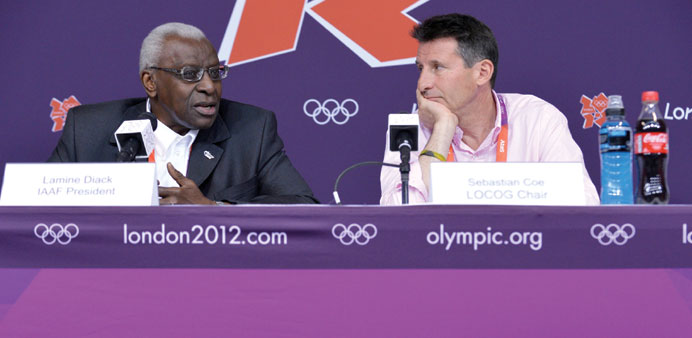Seb Coe (R) and Lamine Diack during the 2012 London Olympics. Diack is under investigation for allegedly taking bribes to cover up doping by athletes.
AFP/London
The doping scandal that has engulfed athletics leaves Sebastian Coe, the golden boy of British sport, facing the biggest challenge of his post-competitive career.
Coe was elected IAAF (International Association of Athletics Federations) president after vowing “zero tolerance” against performance-enhancing drugs, but the revelations of systematic doping by Russian athletes contained in Monday’s World Anti-doping Agency (WADA) report saw him left in the starting blocks.
The Times newspaper has called the scandal “Coe’s toughest race”, while former WADA president Dick Pound had strong words of warning for the 59-year-old two-time Olympic champion.
“Seb Coe is someone who can grasp this, I hope,” said Pound, who chaired the independent commission that produced the damning report for WADA. “His reputation is at risk if he doesn’t.”
Upon being elected IAAF president in August, having beaten Ukrainian pole-vault great Sergey Bubka 115-92 in a tight vote, Coe pledged to maintain “the very highest level of vigilance” with regard to doping. With WADA having accused the IAAF of being “inexplicably lax” in their approach to doping, at a time when Coe was the organisation’s vice-president, they are words that have quickly come back to haunt him.
And they are not the only ones.
Coe described Lamine Diack, his predecessor as IAAF president, as his “spiritual leader”, only for the 82-year-old Senegalese to be arrested by French police over claims he took 1 million euros ($1.1 million) in bribes to cover up positive drug tests.
When media reports emerged that the IAAF had turned a blind eye to hundreds of suspicious blood tests, Coe branded the claims a “declaration of war” on athletics.
Meanwhile, during a trip to Russia last week to open the annual congress of the All-Russian Athletics Federation (ARAF) —a body now facing a ban from the sport—he spoke of the need for “engagement” with Russia and praised the country’s athletes, coaches and officials for their “openness” and “appetite for change”.
To date, Coe has generally avoided opprobrium over his spell as the chairman of FIFA’s ethics commission, despite the avalanche of corruption accusations that has tumbled down upon world football’s governing body in the years since he left.
But he has come under pressure to sever his ties with Nike, for whom he is a global ambassador, in light of the American sport giant’s continued backing of drug cheat Justin Gatlin and allegations of doping levelled at Nike’s Oregon Project running camp in a recent BBC documentary.
Coe has given ARAF until the end of the week to respond to the WADA report, but his stance was castigated in the British media, with The Independent newspaper dismissing his response as “weasel words”.
He was also given an uncomfortable grilling in a televised Channel Four interview over what he knew about the extent of doping by Russian athletes during his eight years as IAAF vice-president.
It is all a far cry from his days as the poster boy of British athletics during the 1980s, when his fierce rivalry with countryman Steve Ovett made him one of the most well-known figures in the sport.
The articulate Coe won Olympic gold in the 1,500 metres at the 1980 and 1984 Olympics, as well as two silver medals in the 800m, and set eight outdoor and three indoor world records in middle-distance track events. His achievements in politics and sports administration have been every bit as stellar, with highlights including a five-year stint in Britain’s parliament and a stunning success as head of the 2012 London Olympics. It means that for all his current tribulations, he continues to enjoy strong support from within the athletics community, but his reputation now hangs on his ability to take decisive action.
Scandal echoes East Germany, says ex-GDR sprinter
Berlin: Accusations of drugs cheating levelled against Russian athletes echoes East Germany’s systematic doping programme and presents the IAAF with a “new dimension to the disaster”, according to an ex-GDR sprinter.
On Monday, a bombshell report from an independent commission of the World Anti-Doping Agency (WADA) detailed systematic doping among Russian athletics, with the consent of the government in Moscow.
The report also said drug tests for their athletes were conducted at a Russian lab, which lacks credibility.
“It looks like it was done in a systematic, state-backed way,” Ines Geipel, a former East German sprinter, told SID, an AFP subsidiary, having raced for the now defunct former communist regime in the 1980s.
“Fundamentally, it seems to have been done the same way it was in the GDR, but the fact is it gives the IAAF a new dimension to the disaster.
“The crucial question is: what happens now?”
Berlin-based Geipel is the president of an association to help the thousands of ex-athletes involved in the former East German state’s doping programme, which yielded more than 500 summer and winter Olympic medals between 1968 and 1988.
Geipel, 55, says she does not put much faith in Sebastian Coe, who became the IAAF’s president in August, because “his recent actions are not very reassuring” as his organisation looks to clean up the sport’s tarnished image.
On Tuesday, WADA took the first concrete measure since the release of the damning report by suspending Moscow’s heavily-criticised anti-doping laboratory.
Coe has given the Russian athletics federation (ARAF) “until the end of the week” to respond or risk possible suspension.

